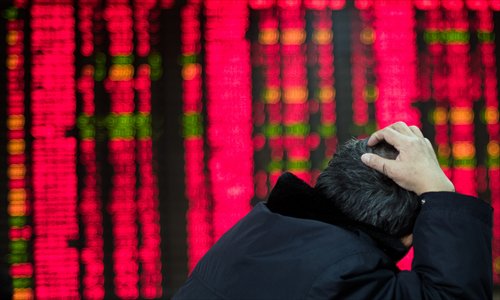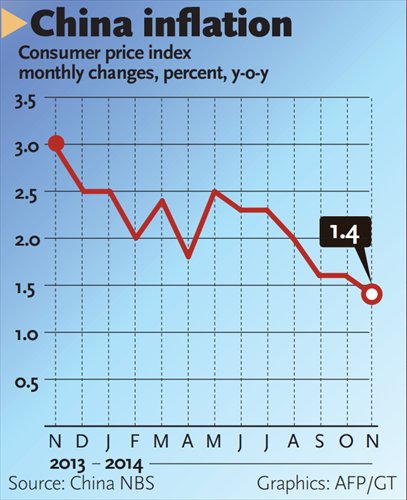Inflation hits five-year low
Premier sees moderate to high economic growth in 2015

An investor looks at stock information at a trading hall of a securities firm in Shanghai on Wednesday. China's consumer inflation rate fell to a five-year low of 1.4 percent in November, the government said Wednesday, increasing concerns over the risk of deflation in the world's second-largest economy. Photo: AFP

Graphics: AFP/GT
China's inflation rate slid to a five-year low of 1.4 percent in November, official data showed Wednesday, triggering speculation over the further easing of monetary policies to spur economic growth, following an interest rate cut on November 21.
The consumer price index (CPI), the main gauge of inflation, increased by 1.4 percent in November from the previous year, its lowest reading since November 2009, according to data released by the National Bureau of Statistics (NBS) on Wednesday.
Pork prices dropped 3.8 percent year-on-year in November, which brought down the overall CPI by around 0.12 percent, the NBS said.
Transportation and communication prices fell 0.8 percent in November from the previous year, fueled by a drop in oil and auto parts prices of 8.3 percent, according to the NBS.
The CPI had risen below 2 percent for the third consecutive month, indicating an increase in deflationary pressure on China's economy, which would have a negative effect on economic growth, Wang Jun, an economist at the China Center for International Economic Exchanges (CCIEE), a Beijing-based think tank, told the Global Times on Wednesday.
The weak data dragged China's inflation in the January-November period to 2 percent year-on-year, well below the country's annual target of 3.5 percent for 2014.
Wang said it's abnormal to see falling pork prices in November, as relatively strong demand for pork consumption toward the end of the year usually pushes up the price.
Yu Qiumei, a senior NBS statistician, attributed the record low inflation rate to international factors, according to a report on NBS' website on Wednesday.
Domestic gasoline and diesel prices fell by 5.6 percent and 5.9 percent, respectively, month-on-month following a drop in international crude oil prices, which brought down the overall CPI by around 0.05 percent from October, Yu said.
Economists interviewed by the Global Times on Wednesday said they expect the country's inflation rate in the coming months to remain low.
Yao Jingyuan, a former NBS chief economist, told the Global Times Tuesday that the inflation rate is expected to rise by around 2 percent in 2015.
The lower-than-expected inflation rate coincided with a continued drop in the producer price index (PPI), a key measure of inflation at the wholesale level, which fell by 2.7 percent in November from a year earlier, lingering in negative territory for the 33rd consecutive month, data from the NBS showed.
The PPI's declining acceleration, largely due to sluggish domestic demand, clearly suggests Chinese enterprises are struggling amid the economic slowdown, Zhou Hao, an economist with the Australia and New Zealand Banking Group, told the Global Times on Monday, adding that the real cost of funds for Chinese firms is close to 10 percent, which will further squeeze profit margins and increase debt.
In the coming months, the PPI, which has seen a monthly growth decline for the longest consecutive period during the last 30 years, is expected to continue to rise even less, the Bank of Communications said in an e-mail to the Global Times on Wednesday.
China is experiencing a rapid drop in its inflation rate and economic growth is expected to slow further in the coming year, Zhou said.
China is expected to lower its growth target for the first time in three years to just above 7 percent from this year's 7.5 percent target at a key ongoing economic conference, according to Yao.
Some believe the latest figures and increasing risk of deflation provide more leeway for further monetary and price-related reforms to stimulate a slowing economy.
Premier Li Keqiang said on Wednesday he looks forward to moderate to high economic growth.
"China is encouraging entrepreneurship and innovation to build new growth engines to spur the economy," Li said during his meeting with Irish President Michael Higgins.
China's central bank cut one-year benchmark lending rates by 40 basis points to 5.6 percent on November 21, its first interest rate cut in more than two years.
In anticipation of milder tweaks to the monetary policy, Wang said there might be one more cut in interest rates as well as in the reserve requirement ratio in the coming months.
Zhou said that he cannot discount the possibility of a reserve requirement ratio cut before the end of this year.
And if the central bank sets a liquidity growth target at around 12-13 percent next year, he said that he expects at least three 50-basis-point cuts to the bank reserve requirement ratio in 2015.
A statement released after a meeting of the Political Bureau of the Communist Party of China Central Committee on Friday said that China will continue to implement a prudent monetary policy in 2015, but Zhou said that it is expected to be milder compared with this year.
Xinhua contributed to this story